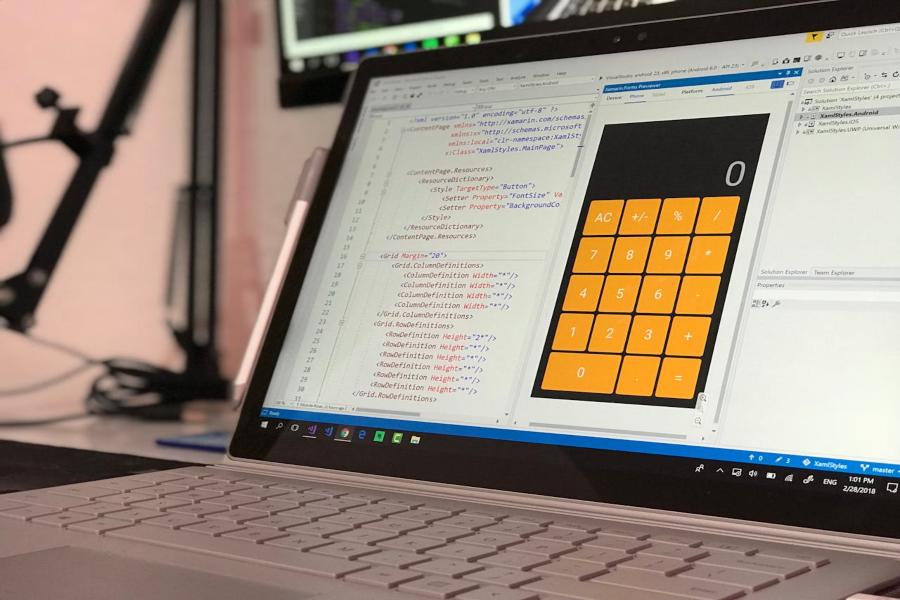In recent years, mobile app development has evolved rapidly, with businesses looking for ways to create high-quality, feature-rich apps that work across platforms. Flutter, a powerful UI toolkit from Google, has emerged as a popular choice for developers. But what is Flutter app development exactly? In this article, we will explore the basics of Flutter, why it’s used, and how it differs from other frameworks. By the end, you’ll have a thorough understanding of what Flutter app development is and why it’s becoming the go-to solution for cross-platform app development.
What is Flutter App Development?
Flutter app development refers to using the Google-developed Flutter framework to create high-quality mobile, web, and desktop applications. Flutter allows developers to write a single codebase that runs on multiple platforms (iOS, Android, web, etc.) without sacrificing performance or user experience. It offers rich, customizable widgets, fast rendering, and smooth animations, making it ideal for businesses looking to build cross-platform apps efficiently.
What is Flutter App Development?
Flutter is an open-source UI toolkit created by Google to help developers build natively compiled applications from a single codebase. Whether you’re targeting mobile devices, desktops, or the web, Flutter makes the process efficient and smooth.
When it comes to mobile app development, Flutter distinguishes itself by offering a rich set of pre-built widgets that work harmoniously across platforms, removing the need to write separate code for iOS and Android. This can dramatically reduce development time and effort while also maintaining high performance across devices.
At its core, Flutter is based on the Dart programming language, which is known for its quick compilation and strong typing system. Developers can create sophisticated UIs and deliver smooth animations due to the fast rendering capabilities Flutter offers. This means that whether you’re building a simple app or a feature-packed enterprise solution, Flutter provides the flexibility and performance needed to meet your goals.
Moreover, Flutter includes a “hot reload” feature, which allows developers to see real-time changes in the code as they tweak the UI. This significantly speeds up the development process, as developers can make adjustments and see instant results without waiting for the app to recompile. The combination of these features makes Flutter app development an attractive choice for many businesses and startups aiming to launch apps quickly while ensuring a smooth user experience.
For businesses looking to target a wide audience across platforms, Flutter’s single codebase solution is invaluable. Instead of allocating separate teams for iOS, Android, and web development, Flutter developers can build once and deploy everywhere. This efficiency, combined with the customization options Flutter offers, has made it a top choice for app developers around the world.
Why Choose Flutter for App Development?
1. Cross-Platform Compatibility
One of the primary reasons why developers opt for Flutter is its cross-platform functionality. With Flutter, you only need to write your code once, and it will work across multiple platforms. This can significantly reduce the development time and costs involved in creating separate native apps for Android, iOS, and the web.
2. Fast Performance
Flutter is known for its high performance, thanks to its use of Dart and its own rendering engine. Unlike other frameworks that rely on platform-specific components, Flutter draws its widgets directly onto the canvas, ensuring smooth performance even in complex applications.
3. Customizable Widgets
Flutter’s vast library of widgets allows developers to build beautiful, customizable UIs quickly. These widgets follow the design principles of both Android’s Material Design and iOS’s Cupertino, giving developers the flexibility to create apps that feel native on both platforms.
4. Hot Reload Feature
The hot reload feature is a game-changer for developers. It allows them to see changes instantly without recompiling the entire application, speeding up the development process and making it easier to experiment with new features.
5. Strong Community Support
Flutter has a rapidly growing community of developers. This means extensive resources, tutorials, and plugins are available, making it easier for developers to find solutions, accelerate learning, and implement new features in their apps.
Features of Flutter App Development
- Single Codebase for All Platforms: Write once, and deploy across platforms like iOS, Android, web, and desktop.
- Beautiful UIs with Customizable Widgets: Create stunning, natively compiled applications with pre-built and custom widgets.
- Fast Rendering: Achieve smooth animations and interactions thanks to Flutter’s high-performance rendering engine.
- Hot Reload: Make real-time changes and instantly see the results, enhancing productivity.
- Extensive Documentation: Access comprehensive resources and community support for faster development.
How Does Flutter Compare to Other Development Frameworks?
Flutter stands out among various mobile app development frameworks, but how does it compare to React Native, Xamarin, or native development? Let’s take a closer look.
Flutter vs. React Native: While both Flutter and React Native are popular for cross-platform app development, Flutter has the edge in terms of performance and UI customization. Flutter’s widgets offer greater control over the look and feel of the app, while React Native relies on native components, which can lead to performance bottlenecks.
Flutter vs. Xamarin: Xamarin is also used for cross-platform development, but Flutter’s simplicity and hot reload feature make it faster and more intuitive to work with. Moreover, Xamarin apps tend to be larger in file size, which can affect app performance.
Native Development vs. Flutter: Native development offers unparalleled performance because the app is built specifically for the platform. However, this comes at the cost of time and resources, as separate codebases must be maintained. In contrast, Flutter allows developers to achieve near-native performance with significantly less effort.
Overall, Flutter app development provides an optimal balance between performance, ease of use, and development speed, making it a solid choice for most projects.
When Should You Consider Flutter for App Development?
- Startups Looking for Rapid Development: If you’re a startup or small business that needs to launch a product quickly, Flutter’s single codebase approach can save time and resources.
- Businesses Requiring Custom UIs: Flutter’s flexibility in creating visually stunning UIs makes it an excellent choice for brands that prioritize design.
- Cross-Platform Projects: Flutter is ideal for projects that need to target multiple platforms without sacrificing performance.
- Cost-Effective Development: For companies looking to minimize development costs while maximizing reach, Flutter offers an economical solution.
Bottom Line
Flutter app development is revolutionizing the mobile app development industry by providing a fast, efficient, and customizable framework. Its ability to create cross-platform apps from a single codebase, coupled with its rich set of widgets and hot reload feature, makes it an excellent choice for businesses and developers alike. As Flutter continues to evolve, it’s clear that it will remain a leading option for those seeking to build high-performance, feature-rich applications that work seamlessly across platforms.
FAQ’s
- What is Flutter app development?
A. Flutter app development is the process of creating cross-platform applications using the Flutter framework, which allows developers to write code that runs on iOS, Android, web, and desktop platforms from a single codebase. - Is Flutter better than React Native?
A. Flutter offers better performance and more UI customization options compared to React Native, making it a preferred choice for complex applications. - Can Flutter be used for web development?
A. Yes, Flutter supports web development, allowing you to create apps that run seamlessly across web and mobile platforms. - How long does it take to develop an app with Flutter?
A. The development time for a Flutter app depends on the complexity of the app, but its single codebase approach can significantly reduce development time compared to building separate native apps.







